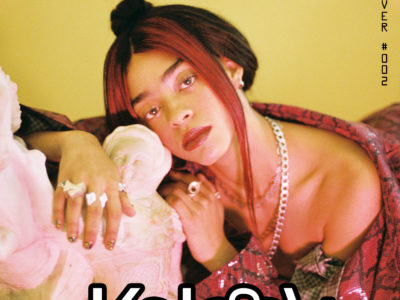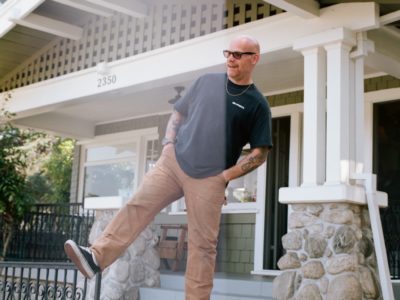The Safdie Brothers, Directors
WORDS BY: ARIELA KOZIN

Feature
Perseverance and creativity are what pushed the Safdie brothers to the forefront of the entertainment industry. Sit back, grab a bucket of popcorn, and witness how the pair are changing the rules of filmmaking.
How to Have a Good Time at the Theater
Ben and Josh Safdie’s new movie, Good Time, will leave you breathless with its incredible, tense pace and brilliant filmmaking. The film starts with Connie (Rob Pattinson), pulling his brother Nick (Ben Safdie) from therapy meant to help him deal with cognitive disabilities. He believes it’s much more effective to teach survival skills on the scuzzy streets of New York. Anyway, they can only trust each other after all they’ve been through together. Nick needs Connie, but Connie needs Nick more.
Somehow, this crash course in street smarts turns into a botched bank robbery, and then a manic, long-winded police chase that ends with Nick in cuffs. This is before the opening credits have even rolled, which when they do are drenched in Onehtrix Point Never’s synth-laden music. What could easily be the overarching plot for the film is just the beginning of our time with this pair. The following sequence of events only turns more desperate, violent, and poignant. Above all, this is a story about dysfunctional love and those people that we often overlook.
It’s one of the more transcendent experiences we’ve had in a theater. Of course, there are many reasons for that—a hypnotic composer, a dynamic cinematographer, risky story telling, and stellar performances—but what may be most notable about the film is how it was created – they didn’t have permits when filming. In the same ad hoc spirit, Josh and co-writer Ron Bronstein wrote a lot of the dialogue on-set. “Josh and Benny were holding their monitors and directing scenes while blocking a four-lane street together,” Rob said. The brother’s guerrilla style and fearlessness that effected everyone else involved and made it possible to achieve art that is both hallucinatory and sharply realistic in our dim political state.
In Conversation with Ben + Josh
The Safdie brothers grew up in Queens and Manhattan, and started making movies paying grim tribute to their hometown at a young age. Their fourth film, Heaven Knows What, caused the biggest splash prior to their current effort, chronicling the lives of heroin addicts in a way that blurred the lines between documentary and drama. It was so strong that Pattinson decided he had to work with the duo after only seeing a still of it. Here, familiarize yourself with the brothers before dropping their names becomes de rigeur – their next film, Uncut Gems, is packed with an arsenal of talent including Martin Scorsese, Scott Rudin, and Jonah Hill, and thus sure to be even more talked about.
Here, they discuss how NYPD mugshots, realistic prison fights, and criminal disguises came together in one brilliant film.
After both Heaven Knows What and Good Time, our first thoughts were, “What the fuck just happened?” Do you want your audience to be left dumbfounded?
Ben: We want people to leave the theater having experienced something. We see so many movies where nothing happens; we just want stuff to happen. Maybe we cram so much in there, and it’s such a short period of time we want you to feel overwhelmed in a way. Not in a bad way. In a good way. It’s supposed to entertain you first, and then ask questions later.
I guess the difference between Heaven Knows What and Good Time is that Good Time isn’t tethered to a specific person, it’s tethered to reality, but it’s not tethered to a specific person. In that sense Heaven Knows What might be a little bit more kind of like, “Oh my god,” because you know this person experienced exactly what you’re seeing or a very similar version of that.
So we wanted to take that level of emotional immediacy with Heaven Knows What and try to apply that to a genre movie. We wanted to have people leave that theater thinking, “That was an awesome movie. That was a great ride,” and then say, “Wait a second. What happened here? What happened there? Why did the cops just believe Rob’s character? Why did they believe Connie when the security guard is lying on the floor? Why did all of these certain things happen?” Then you start asking questions about society that aren’t necessarily at the forefront of your mind, because you’re moving at such a speed.

You develop your films in such an organic way. How do you ensure that your creative process stays on course?
Josh: It was arduous, and it was expensive. Basically the course is, there is no course. There’s no defined course. You’re going out into the world, you’re reading everything you can, you’re meeting everyone you can, and you’re seeing everything you can. Sometimes that leads to unbelievable troves of riches. Like, I met some interesting character who became a friend of mine. He’s a graffiti artist and he ended up being very close with the commissioner of jails in New York City. Then I became friends with him and I saw that whole side of things as well.
For example, I sat in on a couple of nights of arraignments at 100 Centre Street in downtown New York. Basically, to see the people stand trial, not stand trial. They’re being arraigned out of booking and they’re either being sent to Rikers or being released, and in that process I ended up meeting a New York Daily News photographer. He’s been doing this for almost 25 years, so then he became this incredible trove of information, and then he gave me his website and I went to his website and it turns out he used to photograph for the NYPD.
On his website he has a section of those photographs and one of the photographs was of a backpack of a con man who was impersonating a Village Voice critic, and did some kind of weird, messed up kidnapping things. Inside his backpack was a bunch of ID cards and a mini DVD camcorder— things that you would associate with a con man—but also this book called Disguise Techniques: Fool all of the People Some of the Time.
That book ended up being monumentally inspiring. The course was me going and sitting in on these arraignments, but talking to that Daily News guys lead me to discover this book that I consider to be the greatest book on acting of all time, and also ended up being monumentally inspiring for the wardrobe. It answered questions like, “What does someone wear when they’re on the run and are trying to blend in?” When I gave it to Rob he said it was incredible because people actually read these things looking for advice on cons.

So the strategy is to let yourself be free to experience?
Ben: And that will inform the end result. For example, when we were blocking out the scene in jail where Nick goes for a remote and gets into a fight, we originally had a certain way we wanted to block it. We went over it with a stunt man, but then somebody in the scene named Jerome said, “It wouldn’t go down like that,” and I asked, “What do you mean?” He broke down exactly how it would actually happen in jail, down to where people would be sitting, who would stand up, and instead closing ourselves off in favor of stunts we asked the stunt coordinator to listen in.
Jerome is now running the set, and he’s telling everybody where they need to be. So being open to the world around you and allowing it to inform you will change the sequence, but it will make it better too.
Being open to the world around you and allowing it to inform you will change the sequence, but it will make it better too.
You’ve mentioned before that you’ve felt frustrated because you were making this work you were proud of, but you weren’t getting enough eyes to experience it. Suddenly, it’s all changing. Do you have any advice for aspiring filmmakers who feel discouraged the obstacles presented by the over-saturated film industry?
Josh: Yes, obsess, obsess, obsess, and be obsessive. And if you think you’re obsessive, you’re not. You have to do as much work as you possibly can to know yourself and to know your material so that you’re inundated with it, so that basically you’re taking things for granted. So that when you see the movie, you’re not just looking at it from a formal point of view, you’re looking at it from a conceptual point of view, from an artistic point of view, from a philosophical point of view, and you’re scrutinizing yourself for that.
On a professional level, don’t wait for anyone. That’s where we were at. We were in a position where nobody wanted to help us, so we did a lot of this research on our own, and we spent a lot of our own pennies. We went out of our way to do this work in the Diamond District, and that led to a meeting Ariel Holmes (of Heaven Knows What). I met her as a very seemingly normal person, it just looked like she had a day job in the Diamond District.
Ben: Also, just keep working. Just the idea that if you stop and say, “Ok, I’ll make this one short film, and then I’ll wait and see for everybody to come around to it.” That’s not how it’s going to happen. You’re just going to have to keep doing stuff because in a way the world doesn’t want it. You have to demand it. At one point I stood out with a billboard, in front of a theater, handing out flyers for our movie, convincing people to go to the movie and not go see the other movies playing.
We were in a position where nobody wanted to help us, so we did a lot of this research on our own, and we spent a lot of our own pennies.
Connie also obsesses in the movie. He refuses to give up no matter what happens.
Ben: Yes, he has the ability to move forward and see a future without having any past whatsoever. But in our case, we’re very aware of the past and the things that we’ve done and we want to learn from them. Which I don’t know that Connie wants to do that.

Now that you are garnering a mass audience and your next film includes so many heavy hitters, do you have to change the way you’ve made your films in the past?
Josh: No, because if we did, we wouldn’t be making the movies that we’ve been making. We want to try and say something, and if we were to change at all, we’re going to change it based on what we learn. Sure, we listen to each other and the people around us, but we’re not going to bend just to bend.






